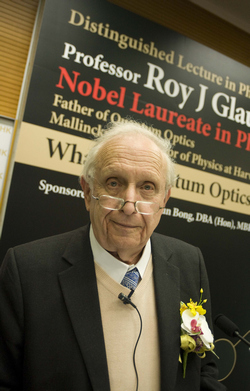Roy Jay Glauber


Professor Roy J Glauber, BSc, MA, PhD
Nobel Laureate in Physics
Doctor of Science, honoris causa (2012)
The January 1942 issue of Modern Mechanix carried a story entitled Whiz Kids, which led with a picture of a tall 15-year-old called Roy Glauber poised expectantly over what the journal called a micro-photographic camera. Underneath the picture the caption simply read: “A future scientist? Maybe not.” Sixty-three years later, in 2005, Professor Roy J Glauber shared the Nobel Prize in Physics for his lifetime contributions to Quantum Theory of Optical Coherence.
Professor Glauber won a scholarship to Harvard just as the Whiz Kid story was being published and as the Second World War deepened. His professional biography became scrambled in ways which almost foreshadowed his own emerging theories about light and nuclear diffraction. At the tender age of 18 he joined Robert Oppenheimer and other scientists working on the Manhattan Project at the Los Alamos National Laboratory in New Mexico. Once the war ended and he completed his academic training at Harvard he worked at Princeton University, the Swiss Federal Institute of Technology, and the California Institute of Technology. His groundbreaking theory on the behaviour of light gave rise to a new field in physics, Quantum Optics, which encompassed Einstein’s Quantum Theory and the field of optics. Hailed as the father of Quantum Optics, he is also renowned for the “Glauber’s Model” which is used to study the high-energy collisions and reactions. Since 1976 Professor Glauber has been the Mallinckrodt Professor of Physics at Harvard University and, since 1988, an Adjunct Professor of Optical Sciences at the University of Arizona.
His work changes our world. Quantum Optics is used in encryption technology, has led to a new generation of powerful quantum computers, stimulated developments in Global Positioning System technologies, improved the accuracy of navigation in space, and enhanced optical instruments. His work on high-energy collisions helps understand the extent to which nuclei crash into one another head-on, which improves the measurements being made at CERNs Large Hadron Collider and our appreciation of the primordial universe and the nature of matter.
Professor Glauber continues to serve education and inspire students. Through words, actions, and deeds he exudes the whole person ethic that Hong Kong Baptist University treasures. His is a record of citizenship through an international outlook and a sense of civility. While Professor Glauber’s record of cutting edge scholarship is world renowned, he also values broad education and is glad of his early training across diverse disciplines. His inquiring spirit and passion for learning never rests. He writes of his early memories exploring the endless farmlands of the US Midwest as a son of a travelling salesman in the 1930s and evokes the spirit of the American love affair with the road trip and Kerouac and Pirsig. His mind knows no bounds, and he continues to inspire us with restless exploration and creativity. His skills were honed not just in Ivy League classrooms and labs, but in his bedroom, building guitars that didn’t play and, in his words, being engaged in projects “the most interesting of which usually failed”. A communicator from the heart, modesty and balance resonate as the personal qualities of a man who wrote that raising his son and daughter as a single parent was a time-consuming but immensely rewarding commitment that was not an experience he would trade for missing papers or recognition. Indeed, we are immensely proud that, over the last 15 years, his visits to the University, his lectures, and sharing with our students mean is welcomed as HKBU family, and has created a lasting bond of friendship between us.
Mr. Chairman, on behalf of the students, staff, and alumni of the Hong Kong Baptist University, it is a great privilege to present this citation for Professor Roy J Glauber, and to reflect publically upon his pioneering contributions to the advance of science and his lifelong commitment to science and education.